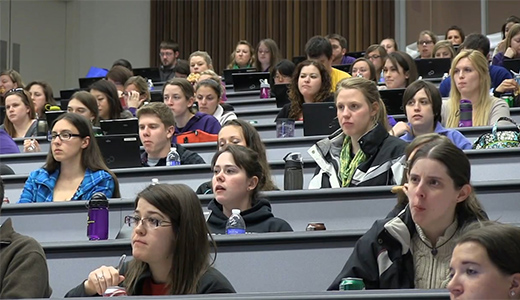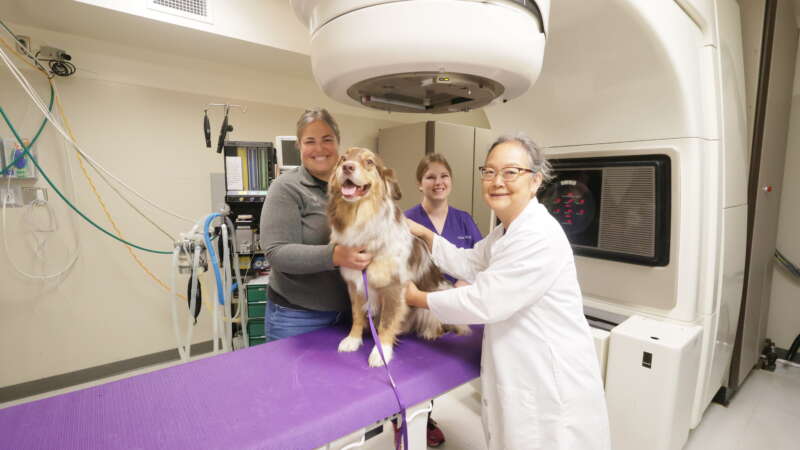Veterinary medicine counselors go above and beyond for their students as they deal with the stress of the four-year program.
From sunup to sundown for four straight years, veterinary medicine students dedicate their time to their studies. For the counseling services at the College of Veterinary Medicine, their time is completely dedicated to those students.
Drs. Mac Hafen and Adryanna Drake are available on-site to provide many different mental health services for students, faculty, staff and clientele of the veterinary school. Not only do they consult individuals on a daily basis, they also provide class presentations and seminars to address the human and relational aspects of veterinary medicine.
Both counselors make themselves available to talk whenever the students need, whether that be early in the morning starting at 6:30 a.m. or over their lunch break. The counselors dedicate most of their day meeting with the students who can catch them between classes, homework and studying. This can be especially hard for the fourth-year students, as their schedules can be restricting of their free time.
“Veterinary students are driven, high-achieving individuals,” Drake said. “They are accustomed to working hard and succeeding. This is what got them here, and this is what maintains their standing here. Dealing with failure, things that are outside of one’s control, can be challenging.”
Students take advantage of having the counseling services right down the hall for their daily needs, but that is not all that counseling services does for students.
In addition to meeting with students, these therapists also teach the students about the importance of taking care of themselves during their busy lives, as well as preparing students for the emotional stress they will have to deal with as veterinarians. According to Drake, the veterinary medicine counselors aim “to make the students aware of the services offered, normalize the stress of training and the stress of transitioning from college to professional school, and finally, emphasize the importance of self-care during stressful times.”
Students get the tools they need to succeed from this program in a multitude of ways, including teaching seminars and meetings held by the therapists. For the last 12 years, Hafen and the vet med counseling services team have had fourth-year students in clinics film themselves interacting with health center clients. Hafen then watches the videos to evaluate the student’s strengths and challenges. He and the student then discuss how to better interact with clients in the future.
The college-dedicated therapists even take this a step further and film the students again, seeing if they used the feedback to change their behavior. Most students are intimidated by being filmed at first but also acknowledge the value of seeing themselves interact. It helps them to become more aware of how their behaviors impact the quality of interaction for the client and is something they could not discover without this program.
The Veterinary Health Center, as well as the College of Veterinary Medicine as a whole, has been “fortunate enough to work with a generous donor that has made many of our programmatic interventions possible financially,” Hafen said. This program and the outside counseling that these specialized counselors have provided has seen amazing results.
These donors have made it so veterinary medicine students do not have to travel to seek the help they need. “Within an already restricted schedule, every minute counts, and the risk of students opting not to seek assistance because it would mean sacrificing study time is high,” Drake said. Having access to the counselors on-site means that more students have the access when and where they need it most, right down the hall. It is also beneficial that the counselors can understand exactly what the students are going through, as they deal with this stress with these students every day.
According to Hafen, they have “partnered with students on developing and implementing their personal ideas for improving well-being, engagement and participation has increased substantially.” More and more students are taking advantage of the services provided and making sure that even during the stressful four years of veterinary school, they are taking care of themselves as well.
Veterinary medicine students gain valuable information from this counseling program, and with their busy schedules, it can be easy to forget about mental health and put it to the side. With counseling services at the forefront, it is easier for students who need the help to be able to get it without question.






